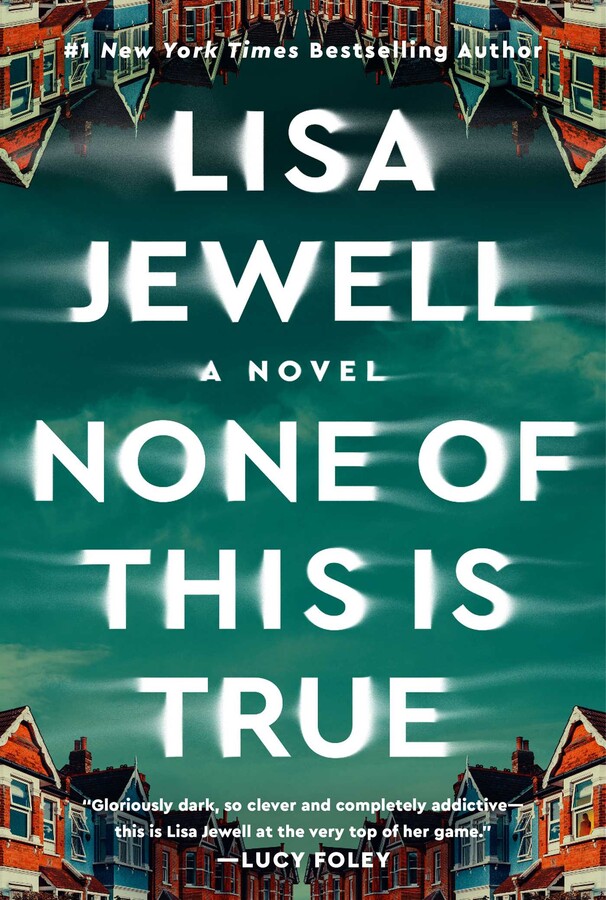When a person walks into a bookstore, what draws them to their next book? Beautiful cover art, a familiar author? For Lisa Jewell’s None of This is True, it could be its captivating title. The cover is nothing to sneeze at—the font has a dream-like quality and the cover has a border of upside-down city buildings. Together, these surreal elements do an excellent job of introducing this mind-bender of a novel, but the title provokes so many questions and prompts readers to dig deeper. When I found this book for the first time, I wondered: what are the lies hiding? Why write a book where nothing is true? What is the truth?
The truth is that the main character, Josie Fair, is not who she seems. Now 45-years-old and stuck living the same daily routine with Walter, her much-older husband, Josie longs for the freedom she should have had if she hadn’t gotten married at 18-years old. She breaks the routine by celebrating her birthday at a nice restaurant, where she meets Alix Summer, a popular podcaster who is also celebrating her 45th birthday. Enamored by Alix’s glitz and energy, Josie approaches Alix, her birthday twin, and decides they must be friends. She convinces Alix to start a new podcast with her to capture “the change” Josie insists she is about to initiate in her lifestyle. However, as the podcast progresses and the book switches between the two’s perspectives, it soon becomes clear that Josie is hiding something sinister—a plot to murder her own family.
This novel explores how people create illusions for others, especially on social media. None of This is True places a heavy importance on appearances, both in what the world sees and, more interestingly, what the world doesn’t see. Josie hides her own issues from other people by not interacting much with others, desperately trying to appear like a normal mother to a normal family, but those problems are still present under the surface. She’s aware of them, so aware to the point that it is putting a strain on her mind. Then she meets Alix, who is everything Josie is not; she has lots of friends, a nice house, cute kids, her successful podcast. To Josie, Alix has the life she longs for, but also views her as a kindred spirit. She listens to Alix’s podcasts and scrolls through her social media posts, equally admiring and envious. Towards the end of the book, at the end of the chapter labeled “Sunday, 28 July” (the book doesn’t have chapter numbers), she tells Alix,
“That’s why I wanted to share my story with you, because we are alike, you and I. We’re both idealized wives with disappointing husbands. We’ve both been living in the shadows of awful men who chose us because of what we represented, not for who we are. We both had more to give, more to offer. And now Erin will wake up and say things about me too, and those things won’t be true…You’re the only person in the whole world I can trust to know the real me, Alix.”
When we read Alix’s perspective, we learn she has her own problems. She’s growing bored of her podcast, her husband disappears every weekend to go on benders (and maybe cheat on her, but she’s trying not to think about it)—she’s not perfect, a realization that drives Josie to try to “fix things.” These imperfections are a highlight of the novel and are what draws Josie to Alix as someone like her. The effort Josie puts into “fixing” the situation does more harm than good, both in terms of her family and with Alix.
None of This is True is a masterclass in building tension. Josie is very good at lying to those around her, including the reader, and so her true nature as a killer is hidden under layers of lies. However, tiny hints are scattered throughout the novel. In the first chapter, Josie sees Alix for the first time. She’s envious of Alix’s popularity and her happiness. As she reflects on her forty-five years and how fast time is passing, she thinks her grief about it “means she’s wrong, that everything, literally everything, about her is wrong and that she’s running out of time to make herself right.” In pursuit of Alix’s glamorous lifestyle, Josie inserts herself in Alix’s life, escalates to stealing her personal effects, and skyrockets from there. By the end of the novel, I felt very much like a boiled frog—unaware of the slowly-building heat until it was too late (much like Alix)—but utterly enthralled by Josie’s actions after her mask was torn away. As Alix puts it, being around Josie was “like when you’re driving down windy roads and you deliberately close your eyes for a second, just to see what happens.” There’s a vicious curiosity that pulls the reader deeper and deeper into the plot—I for one could not wait to see how far Josie would go and tore through the book in a day.
While I enjoyed None of This is True, there was one aspect of the novel that raised an issue for me, and it is a common issue throughout the psychological horror genre: reinforcing a fear of people with mental illnesses. Movies, like Split (2016) and American Psycho (2000), lean into this trope by presenting the illness inaccurately and as an evil force, leading to a common misconception that people with mental illnesses are dangerous to be around. While it is perfectly reasonable to be scared of someone who is behaving unpredictably and you believe can hurt you maliciously, like Alix experiences, the majority of people with mental illnesses that are stigmatized in this way are not violent or evil; reinforcing the stereotype is also cliché and not as interesting or nuanced as it could be.
While I have problems with the way mental illness is treated in the novel, I really enjoyed reading None of This is True. Lisa Jewell does a fantastic job of writing an exciting thriller while simultaneously making her characters complex enough that readers will be confronted with the thought-provoking dilemma of having sympathy for a killer. Josie is an irresistible trainwreck of a character and Alix has extremely relatable struggles with money and relationships. If you are interested in a dramatic, spine-tingling plot, then I recommend this novel.

